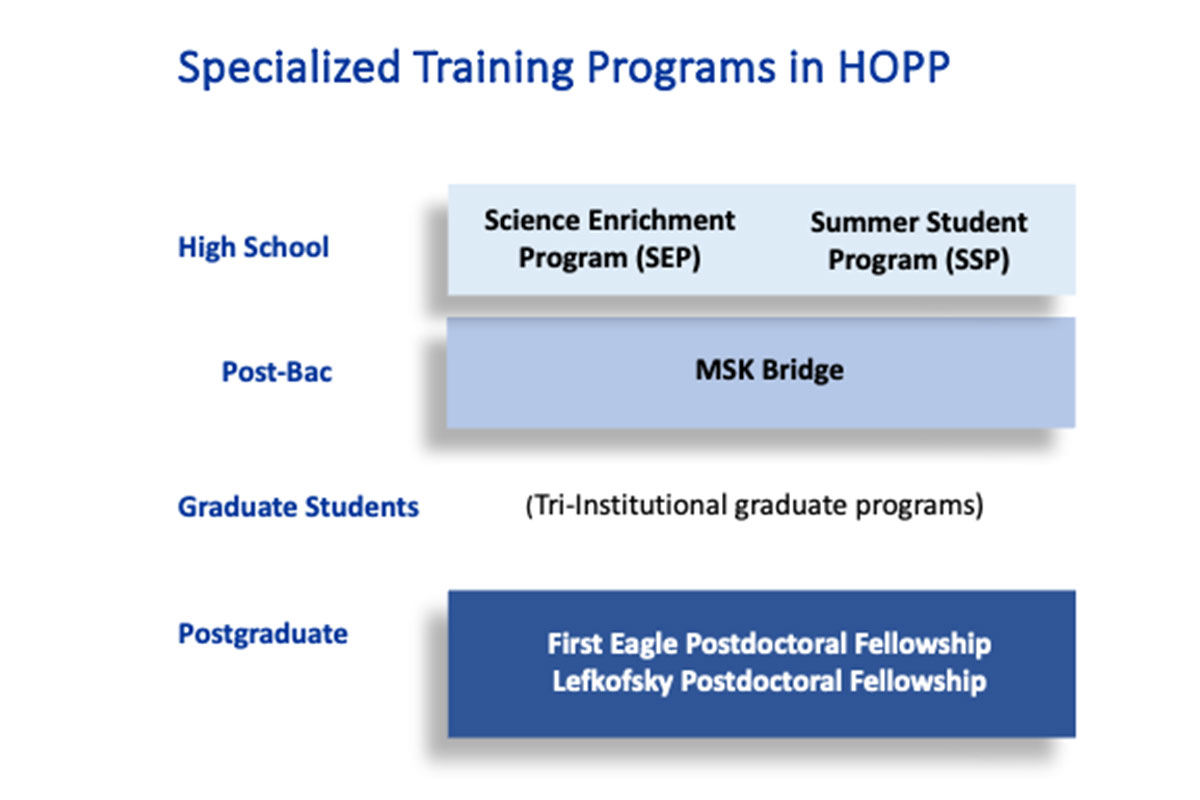Memorial Sloan Kettering (MSK) is an internationally recognized, premier cancer center with an exceptional record of accomplishments in translational research to improve cancer therapy. HOPP faculty welcome graduate students from the Gerstner Sloan Kettering Graduate School of Biomedical Sciences as well as and postdoctoral trainees from a variety of scientific and clinical research backgrounds. HOPP has also developed specialized training programs to prepare scientists all levels for successful careers in translation oncology, including several that fulfill our commitment to improving diversity in the education and recruitment of biomedical scientists.
HOPP hosts specialized programs for high school students, graduating college students, and postdoctoral fellows interested in gaining experience that will help them prepare for a career in translational cancer research.

Science Enrichment Program (SEP)
The goal of the SEP is to supplement the scientific education of high school students from under-resourced schools or underprivileged backgrounds. The program provides a broad introduction to the laboratory and clinical research environments, utilizing a cohort-learning model for support and encouragement. In the first year, the SEP engages students in cancer biology and genetics lectures as well as basic lab skills at weekly seminars and laboratory classes led by HOPP faculty, pre- and postdoctoral trainees, and administrative and laboratory staff. Students are invited to participate in mentored laboratory or clinical research experiences in the second year. The program aims to jumpstart the career trajectory of SEP students by offering opportunities to learn about professionalism in the workplace and networking.
For more information, visit our site here.
Summer Student Program (SSP)
The goals of the SSP are to expose high school students to a breadth of cancer research in the basic and clinical sciences, promote student knowledge of translational and clinical research, and to enhance critical thinking skills, with the aim of encouraging students to further their interest in science and cancer research. HOPP sponsors over 20 students annually in competitive, lab-intensive summer internships. Students are matched to a mentor and assigned an independent research project. Students also participate in other activities that expose them to diverse departments and fields of interest within MSK. They tour the OR, are taught how to read and interpret scientific journal articles, attend multiple seminars, and are invited to weekly luncheons hosted by HOPP Principal Investigators. At the end of the program, students present scientific posters describing their summer research projects.
For more information, click here.
MSK Bridge
The MSK Bridge program supports the career development of undergraduate students from backgrounds underrepresented in the sciences by offering a gap year of research training in an MSK lab. The program offers guided mentoring including introductory coursework in cancer biology and hands-on training in basic laboratory skills to supplement their undergraduate science education. Students will also complete lab-specific certifications relevant to the research technician position of their mentor lab.
Visit our site for details.
First Eagle and Lefkofsky Postdoctoral Fellowship
Through generous funding provided by the First Eagle Fund and the Lefkofsky Family Foundation, two postdoctoral fellowships are available to Human Oncology & Pathogenesis Program postdoctoral scholars in the field of translational research. The goal of the First Eagle and Lefkofsky Fellowship is to support a critical stage for early career scientists — the transition from mentored postdoctoral research to an independent research position. Each fellowship is for a two-year period and supports one early career scientist pursuing their postdoctoral research at MSK and working on an innovative translational research project.